Prepare for your Australia Working Holiday Visa by finding out what I wish I’d known.
As an American, my tips will be especially helpful to U.S. Citizens on Australia Working Holiday Visas, but it’s a helpful and unusual checklist for anyone traveling, moving, or immigrating to Australia.
Update 2017: FYI, OZ is considering upping the visa age limit. Yay! Not yay: they’re considering taxing your forced retirement savings at 95%. Read more here.

Your biological clock isn’t the only thing that’s ticking. – photo: pixabay
1. Don’t wait to get your Australia Working Holiday Visa
The Australian fiscal year runs July 1 to June 30. July is when many government (visa!) fees increase. You’ll save yourself a good chunk of cash if you apply before June 30th. You have up to a year to enter Australia starting the day your visa is granted1as of April 2017, which happens for many within 24-48 hours. Just make sure your life situation will work out to enter Australia within the next 364 days.
2. Get a Google Voice account now
Google voice currently offers an amazing service to U.S. Citizens FOR FREE. You need an American IP address and an American phone number, so this one is tricky 2but not impossible to take care of if you’re not on American soil. Not everyone has Skype, Facetime, Viber, Whatsapp, or even a smartphone/laptop/tablet. But I’d guess most people you know have a phone. If the number is American, Google voice allows you to call them for free! FREE! The rates to numbers outside America are super competitive. You’ll be able to call Australians for less than it will cost you to call them with your Australian phone. (see #8)
3. Stay in Australia for the duration of your Working Holiday Visa
I have a heart attack when people say they want to use some of their precious visa time traveling elsewhere. 3Many are lured by the relative closeness of Asia, New Zealand, etc. Nooooooo!!! Okay, ultimately, your life is up to you, so do whatever you want. But hear me out. Once you enter Australia, your visa clock is ticking. If you go traveling for 4 months in nearby Asia, you don’t get those 4 missed months back. This will probably be the only time in your life that you have an entire year in Australia 4or any country that has a WHV program in which you can just go with the flow and be footloose. In the future, your maximum length of stay is usually only 90 days: if you want longer, you have to explain yourself and your plans. So, earn as much cash as you can, and at the very least don’t burn your once-in-a-lifetime Australian freedom traveling elsewhere!
4. Bring Half the Clothes
Okay, sorry — I couldn’t help a cheeky blog reference. I mean it, though.
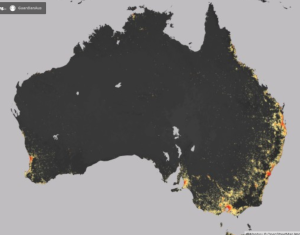
You see the red areas? No? Look closer. Those are the cities. You see the yellow? That’s everyone else. See the black? That’s hot and empty. See size comparison with Europe or the U.S. All great stuff to know if you’re going on an Australia Working Holiday Visa! image courtesy of theguardian.com
More than 85% of Australians live within 50 km 531 miles of the ocean. The ocean moderates the weather. People from much of Europe and the majority of 6non-coastal U.S. states would say Australia is “mostly summer weather.”
Keep your packing list for your Australia Working Holiday Visa short. Bring a week worth of summer clothes and a week worth of winter clothes that you already own. That’s heaps. Please allow me to convince you:
- Preparing for every situation isn’t possible: you’ll just end up lugging around stuff you never use. When you find yourself in need, you can cheaply fulfill your needs at an op shop 7that’s the name for thrift stores here, short for “opportunity”
- Australia has its own unique style. If you bring an entire wardrobe of clothes you wear now, you might find yourself feeling out of place. Compared to the U.S., Australians 8especially Australian women dress up. For men, baggy clothes are far less common and can be considered frumpy.
You can read more of my packing thoughts here. That list also contains items for round-the-world trips, so you definitely don’t need it all. The clothing part is still applicable. It has arguments for or against every item, so you should be able to make a decision by applying the logic to your situation.
5. Get the ball rolling on money matters
Aside from the technical requirement of having $5000 AUD 9As of April 2017, the Immigration department requires “sufficient funds (generally AUD 5000)” + “funds for a return or onward ticket to depart Australia.” They used to say you had to have a certified copy of a bank statement showing you have access to funds of at least AUD 5000. Most people say they are not asked for proof on arrival. (I wasn’t.) Some people say they temporarily borrowed the money from family or friends to print the statement, then returned the money. In my opinion, there is no reason not to have sufficient funds (and insurance!) proof in hand when you arrive. at your disposal, obviously you’ll need immediate access to cash when you begin your Australian working holiday adventure. When you finish your holiday, hopefully you’ll have a large sum saved that you want to transfer out of Australia. You could just waltz out of the country carrying thousands in cash, but rumor has it border officials at your onward destination can hassle you heavily about it and can even seize it in certain cases.
Because you’re a Half the Clothes reader, there’s a solution that solves all these problems:
- set up a bank account before you arrive
- do a fee-free international money transfer to your new Australian account
- then do another fee-free transfer to your home account when you leave.
While many of the transfer services charge fees or have crap rates 10and don’t even get me started on banks! Their rates are shameful!, using this link from the best international money transfer service (OFX for me!) will allow you to bring money to Oz and take it back home without ever paying a single transfer fee. Here’s more on OFX and Why I Love Them.

You after you finish your Australian working holiday and then get your second free international money transfer to fuel your next adventure. #winning photo: pixabay
You can also carry cash over with you, but many people feel uncomfortable carrying around big amounts of money. 11For the record, I don’t. This method is my arrival go-to. But I’m a crazy risk-taker who has almost died many times. I don’t expect everyone to be like me. And there’s that whole thing about border officials using their anti-drug-cash-laundering powers on you and your pocket full of bills. If your home bank doesn’t charge foreign ATM fees, ATM withdrawals can be a good option. If you have to pay a fee with each withdrawal, you might as well just do the cash carrying thing since you’ll presumably always been making huge withdrawals to save on fees. If carrying large amounts of cash doesn’t frost your cookies, then setting up an OZ bank account and doing a fee-free transfer from your home bank is the way to go.
6. Don’t use hostels to start your Australia Working Holiday
I’m assuming the “work” part of your Australia Working Holiday Visa is important to you, right? Then think twice before using a hostel as your main haunt.
You’re going to have a week or two of settling in 12i.e. not working as you wait for your TFN 13tax ID # to arrive in the snail mail, get your bank account 14Getting a bank account before you go might save you fees (if you choose Commonwealth). I’ve been told repeatedly that you need to open it within 28 days of arriving, or you’ll have to provide 100 points of ID and a permanent address (NOT a hostel or hotel). If you don’t get in on this Commonwealth deal, you better get used to spending money you’d feel righteous about in the U.S. Australians are really nice, which means they don’t feel entitled to free checking and don’t get outraged about not having it. Sometimes the nice guy does finish last. Welcome to a system for nice guys!started, figure out your phone situation, etc. Many people base themselves at a hostel in the first major city they land in, which means starting off your Australia working holiday visa by tossing a minimum of $400 15in accommodation costs down the drain.
Additionally, hostel guests are often people who are also newly arrived and looking for jobs. It wouldn’t be unreasonable to expect to spend most your evenings drinking beers in a room full of bunk beds taking turns boasting about how many copies of your resume/CV you’ve handed out without getting a single call back. While hostels can be lots of fun, depending on your age/character you may be less enthused about the party scene.
There is a chance you’ll meet departing travelers who might have job tips for you, but there are lots of first-hand tales of people burning their entire savings while living at a city hostel and trying to find work.
So what to do instead?
7. Organize a Work Exchange to launch your Australia Working Holiday Visa
Are you excited about meeting Australians? Do you like helping people? Are you happy to work hard? If you said yes to all, a work & culture exchange is definitely for you.
What is it? Websites exist to connect people who need help with people who are willing to help. The host (person needing help) gives food and a place to sleep to the person who is willing to help. In exchange, the helper works for the host four hours each day.
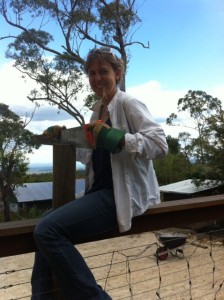
I started my Australia Working Holiday Visa with a work exchange in the Blue Mountains. (pictured) I loved it! Am still friends with my host and talk to her a few times a year!
This is awesome because:
- You have to wait around anyway. Museums, landmarks, parks, and partying will quickly become too boring to distract you from the inevitable anxiety that accompanies awaiting answers about your Australian future. If you do an exchange, you’ll be distracted at least half the day. And you’ll get a sense of accomplishment, even when a job hasn’t come through quite yet!
- Built in culture translators! Your host knows the ATO is where you get your TFN, can explain why it’s good a potential employer told you to come by for a stickybeak, and will keep you from missing out on a Golden Gaytime!
- They know people! People who live in Australia! They can help connect you to individuals who might be able to use your particular skills. You’ll naturally end up networking with lots of locals.
- You get to help people! Which may be even better for you than broccoli.
- You’ll build an Australian reference. I never had this as an intention, but an amazing Australian couple who I volunteered with for months ended up providing several references for me – from jobs to a partner visa.
- You’ll save $. Culture shock is expensive. The anxiety brought on by being in a new place often cause people to seek out comfort in forms that often cost money – cozy hotels, lots of drinks out, food splurges, etc.
- You’ll learn stuff! Building skills, food-growing skills, animal-husbandry skills are just the start of a long list of things you might learn. I’ve re-finished sail boats, given ponies haircuts, built fences, fed lambs, milked sheep, made cheese, build trellises, rendered walls, made butter, harvested honey, repaired plaster – so many cool things!
HelpX, Wwoof, and Workaway are the big three. My preference is HelpX! Here’s why.
If the idea of hauling wood or painting walls or weeding a garden four hours a day for a stranger doesn’t appeal to you, please don’t organize a work exchange. 16An alternative that’s financially saavy – rent a furnished apartment with flatmates for a month, or hook up with other new arrivals at a hostel and rent an airbnb place together. You can’t expect your host to be excited about doing things for you (feeding you, connecting you to their community, giving you a place to sleep, helping you figure out your new Australian life) if you aren’t excited about doing things for them.
8. Figure out your phone situation
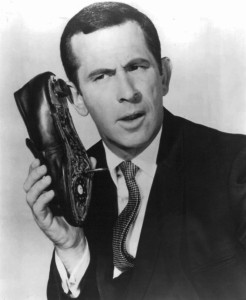
Of course you can hear me now. Rural phone service in Australia is *awesome!* Provided you have Telstra, of course.
To get work in Australia, you’ll likely need an Australian phone number. Can you use your current mobile phone? That depends on whether or not it is A) unlocked, and B) compatible with the carrier you choose.
If you’re going to need a new phone and want it to be “smart,” consider buying an unlocked phone at an undoubtedly cheaper price before you leave home. 17Unless, of course, you are going to Australia via a destination with cheap electronics. It’s unlikely that Australia will be cheaper, unless the exchange rate plummets further. You can also buy a phone in Australia: I just got a cheapie Nokia for $50, but it requires breaking your smartphone habit. 18I didn’t have a smartphone habit, so it was relatively painless. However, if you’re used to predictive texting, maps on the go, or snapping and sharing photos in real-time, get ready for some big steps backward.
Once you figure out your phone, you have to pick a carrier. The most expensive but most ubiquitous is Telstra. They have the oldest and best networks.19Telstra was once the only telecommunications company. It was state-owned and run. Telstra was slowly privatized starting in 1997. Because Australia’s topography is relatively flat and the average elevation is 330m, you can almost always “see” a Telstra tower. 20Those accustomed to American cell phone coverage will be blown away. You wouldn’t believe the random, remote places you’ll get coverage here. If you’re with Telstra, that is. If you have any inkling that you’ll work rurally, I’d recommend them highly. I started out with Optus because it was cheaper, but had to switch to Telsta 21which included having to buy another $50 Telstra-compatible phone when my work took me to an isolated area for 6 months with Telstra-only service.
Other big carrier options include Optus and Vodafone. This comparison website lists 30 options at the time of writing. Another comparison website (who contacted me as asked to be added here and seems legit, but you never know…) lists 36 options.
9. Consider House Sitting
Especially around the holidays, school holidays, and during the summer, loads of people go away on long vacations. If you’ve got the life experience to convince someone you’re competent to care for their home and pets, it can be a great way to experience a different part of the country. You may even be able to work part time or full time while sitting. Especially if you’re traveling with a partner and can share pet duties. Jobs are found on house sitting websites. For more, read How to Become a House Sitter. You can read about some Australia specific sites (which have more listings for Australia than international sites) in The Best (and Worst) House Sitting Websites.
10. Don’t get your employment hopes up too high
Three things you should know:
First —
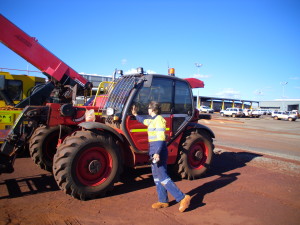
Even though I could *already drive a telehandler* I had to take a $1,500 class to get a piece of paper that said so.
Australia loves giving out little pieces of paper that say you know what you are doing. There is a huge industry raking in vast amounts of cash in exchange for caging people up in a classroom all day, issuing tests that don’t hold water, and giving participants a certificate or “ticket”.
What does this mean for you?
Well, have you been driving a forklift for the past three years? Yes? Okay then, do you have an Australian-approved piece of paper saying so? No? Well, that’ll be up to a thousand bucks, thanks, before you can legally drive a forklift in OZ. 22Just guess how much it costs to say you understand what goes into hold the stop sign in a construction zone (roadworks)? Six”¦ hundred dollars! Have you been pounding nails since you were thirteen? Well, you’ll still need to get your white card ($50, thanks) before you can work construction here. An old hat at bartending? You’ll still need your RSA – up to $50.
I’m not saying you’re not going to get a job. I’m just saying there are barriers that wouldn’t even cross your mind. Australia is the actualization of the reputation that America has – rules and red tape trumping common sense. Give yourself a month or two to network and see what comes up. But after that, especially if you are bringing specific work experience or skills, be ready to pick a direction and invest in the right pieces of paper that you’ll need to get the job you want. You might have to spend $ to make $. Sorry folks, but you’re headed to Rome and might get stuck doing as the Romans do.
Second —
The six month per-employer working limit can be trouble. (Update 2017: It’s now theoretically possible to work for more than six months for the same employer in certain situations. However, immigration makes it clear that, “Permission to work longer than six months with an employer is only granted in limited circumstances.”)
Often jobs will be advertised at “temporary,” but what they’re really looking for are potential permanent employees that they don’t have to commit to at the outset. So hiring someone who isn’t legally allowed to become a permanent employee isn’t what they’re looking for.
As I searched for skilled work, this issue came up again and again.
Third —
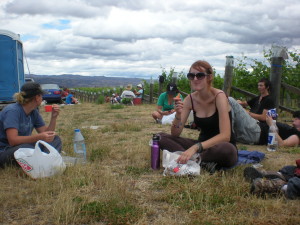
Lunchtime with a bunch of backpackers while working in a vineyard in New Zealand – a few years before I went on my Australia Working Holiday Visa. From what I’m told, ag workers rights are way better in NZ. The work (here: trimming shoots) is still monotonous, repetitive, and ergonomically crappy, though.
If you’re entertaining the idea of an agriculture job, definitely don’t pay for someone to get you one. Not only will you be competing with 417 Working Holiday Visa holders who stand to gain more than just money if they get an ag job, 23Most non-American Australian working holiday visas offer a one year extension in exchange for doing time in the ag industry. This should be a clue”¦ they have to entice people to do it. but these jobs are repetitive, back-breaking work. 24This from a woman who is no stranger to heavy lifting I know firsthand! If you’re 18, it will be an epic story later in your life. If you’re 28, you’ll have a much greater awareness of just how much it sucks. Just recently there was an expose on the Australian news of just how badly workers are sometimes treated. And this guy’s story is a lesson in what can go wrong in the ag job world.
Update 2017: As of November 2016, those on the 462 Working Holiday Visa have gained eligibility for an extension if they do 88 days of ag work in Northen Australia (which includes the Northern Territory, northern parts of Queensland, and northern parts of Western Australia.) More details here.
Bottom line: work in the ag industry is often talked about as the easy-to-get, low-hanging-fruit of the Australian job world. I beg to differ. The only thing this work has going for it is that the people hiring you won’t be gun-shy about your 6 month working limit.
Update: the guy who inspired this article just returned from Australia and is happy to share his story with everyone. Check it out!
His pro tip: Anyone looking for hospitality work in the greater Melbourne area should get added to the Facebook page called “Melbourne Bartenders Exchange.” More of his Melbourne-specific advice here.
11. Start Saving for Insurance
I haven’t researched how medical care works for countries that have reciprocal agreements with Australia. However, It’s a condition of all Australian Working Holiday Visas that you are insured. For Americans (and perhaps other nationalities), this generally means availing yourself of travel insurance. Find out where to get it here: Travel Insurance 101. And if you don’t want to end up a sob story, read this: Travel Insurance 201: Don’t Get Duped.
12. Cram in as many downloads and uploads as you can
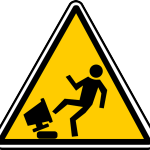
Half the Clothes recommends avoiding this move – especially because, while using your Australia Working Holiday Visa… it’s probably not your computer!
If you’re coming from the U.S. or Europe, prepare for a bit of internet culture shock.
- A) Apparently unlimited data is not a god-given right in every corner of the world. The smartest man I know tells me Australian data is so expensive because a majority of content has to arrive from elsewhere (i.e. the U.S. and Europe) through one of just a handful of fiber optic lines. Demand is high, supply is low, prices are high, and data is *not* unlimited.
Update 2017: Things have improved. Expensive unlimited mobile plans now exist, but most my friends are still stuck on what’s affordable and struggling not to run out of data each month. At home, unlimited data is now common. - B) Australia is not “online.” Not in the sense that Americans and Europeans are used to. Not every business has a webpage, news is not necessarily available in realtime. Think back to what the internet was like in the early 2000’s and you’ll have an idea of Australia today. 25Example: in the U.S., if I smell smoke from a fire, I can type “[my location] fire” into Google and get accurate hits with info on what’s happening. In Australia, Perth’s football stadium caught on fire sending a giant cloud of smoke pouring into the sky, and there was nothing online for hours. Example #2: I tried finding farms that harvest and press olives in a popular wine region just outside a city of over a million people. The best I could do was a list of people who were members of the olive growers association and the website for a storefront selling olive oil. Welcome to 1999!
To prepare for internet life in Australia:
- Download — if you’re a big media consumer, get all the seasons of whatever shows you’re planning on watching before you leave the land of (internet) plenty.
- Upload — especially if backing up your device(s) involves the cloud and lots of data transferring.
- Start letting go of your expectations that you will find things online
- Get ready to endure the black screen of geographic punishment. 26Often you will click to watch a video someone shared on Facebook and instead arrive at a black screen that says “This content is not available in your area.” Comedy Central is one of the worst offenders, so get your fill now if you’re a big fan. Or”¦
- Consider setting up a proxy service – HideMyAss has a free option and is well-respected. 27There are lots of free and paid pieces of software that will give you an IP address from a country of your choosing. I find the free ones often don’t work because the service “recognizes” them. As in, everyone who wants to be from the U.S. is getting one of a handful of IPs, the service sees the same IP over and over and identifies it as suspicious and rejects you anyway. Some of the free ones do work well but have a small data limit, which videos will use up rather quickly.
- Remember to be sensitive to your internet usage if you are a guest in an Australian home. Large data packages are becoming more common, but many folks still have just a few gigs of data each month. Always ask before starting large uploads or downloads, video chatting for an hour on skype, or going on a YouTube binge.
13. Get ready for sticker shock.
Yeah — wages are great in Australia. And I think it’s pretty cool that the woman slinging drinks or pounding nails can earn a wage similar to a person crunching numbers on a computer screen. But high wages mean high labor costs which mean higher overall cost of living. Plus remember that bit about the nice guys finishing last? All this means you can absolutely pay through the nose for stuff.
If you have ever lived on rice and beans or lentils or ramen noodles, 28Fun fact: Australians call them “two minute noodles” you’ll be fine. You already know how to stretch a dollar and ferret out bargains. However, things you never considered splurges will challenge your budget prowess. Beer out? $10 a pint. A dozen eggs? $6. Avocado in season? $2 each. Out of season? $5 each. 29I actually saw a sign on the road advertising avocados — 2 for $5”¦ like it was a deal great enough to get people to pull over and come into the store! Over time, hopefully you’ll join the nice guys, accept the absurdity, and hand over large sums of cash without an internal sigh of disgust.
I tried to shop at Asian groceries, and I got great at converting between pounds and kilos to price compare. $4 a kilo for apples seems a bit pricey until you divide by 2.2 to get $1.82/lb. Not bad after all. And, helpfully, most things are sold by weight, which makes price comparison especially easy. Most supermarkets even have the price per 100g printed on the shelf label making it easy to compare different-sized jars of peanut butter, packages of crackers, etc.
For household goods from kitchen to bedroom to gym, check out The Reject Shop.30Yup – it’s really called that! If you want new clothes instead of op shop31thrift store duds, Rivers is a cheap clothing outlet.
14. Score a great transport deal
Road
A little known secret that might help you get around? Campervan relocations. These are RVs to Americans. Companies abound, but they often need assistance moving their fleets. Help them out and you’ll get a deeply discounted rental – sometimes just $1! That’s not a typo!
This can help you see part of the country on your bucketlist or move to a new location where you want to work.
Look to see which destinations each company has coming available, then gather up some friends from a hostel or gumtree or a rideshare program to pitch in on petrol and get going!
Air
It’s worth giving this woman’s secret a try. TLDR: Check domestic flights via foreign websites. She used Expedia Japan and saved 50% on flights. You may have to use an incognito window, and maybe even a proxy service (see part II of #9) to get on the site. Give it a try and let us know in the comments if it worked for you, too!
15. Don’t Plan on Hitchhiking
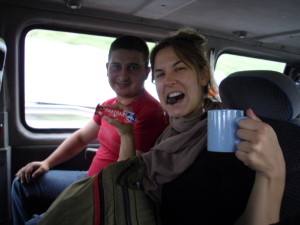
These guys only picked us up in Europe because the town abbreviation I’d made up for my sign was also the abbreviation for their country!
Let me begin by saying I’m a fan of hitching and have done so in several countries. I’ve even done it in countries where people swear I’ll never get picked up. So, I consider myself qualified to say that Australian hitching shouldn’t be on your list of realistic possibilities.
Why? Between cities — especially cities in central and Western Australia — the country is remote and desolate. It’s like long stretches of Nebraska minus the farmhouses. The roads are primarily two lane. Gas stations 32Australian: Petrol Station are often separated by exactly the average distance a car can travel on a tank. Traffic can be incredibly infrequent, the days unbelievably hot, water entirely absent.
If you are unlucky enough to be dropped on the side of the road, it could be hours before a car passes and more than half a day before one stops for you. If things go wrong, you have little to no recourse. If you’re lucky, someone might pull over out of curiosity or to save you from what they will perceive as an obvious suicide mission.
In dozens of trips from the city of Perth to just the sort of region I’d normally see people hitching toward in the U.S.A, I never ever, ever saw a single hitchhiker. Ever. I think it’s not part of Australian culture to put yourself out there in the way that hitching requires, so lots of cars will just double-take in bewilderment and keep driving.
Bus tickets aren’t all that expensive, and there are a few rideshare sites with activity!
16. Learn Basic Australian Vocab
You think, “I speak English. Australians speak English. Sorted.” (Actually, you only thought “sorted” if you’re from another Commonwealth country. Or have spent a lot of time in one.)
Do yourself a favor. Learn some Australian slang. Truly. Just the fact that they shorten everything will leave you terribly confused. Then you have to sift through the accent. Think you’re going to rock up and start bartending/any other service job? I learned the hard way in New Zealand 33another Commonwealth country! that knowing casual slang is a must.
These Half the Clothes posts will get you started on your Aussie vocab & culture:
- Why Australians Think I’m an Asshole
- Why Everyone is Talking About Pot Plants
- Is That a Banana in Your Pocket”¦?
- Australians Really Eat Fried Mice
- When Being “Paid Out” is Bad
- Australia’s Richest is a Woman (language alert!)
- Australian Vocab Lessons & How I Misplaced an Entire Day
- Skylark is Not a Bird
- Why Canadian Bank Notes Come From 7,700 Miles Away
- Why Australians Convert Cars to LPG
- Things You’ll Only See in Australia
Here’s the (growing list) of the best stuff I’ve seen on the world wide web:
- On sausage sizzles and golden gaytimes
- On “seebs” and men called Mikey and Benny and Paulie
- 50 Reasons Australia is Great
17. Get ready to have the time of your life!
Australia is an amazing, gorgeous place. The people are wonderful, kind (on top of being friendly) — hilarious, sharp-witted, and often – as Cards Against Humanity puts it – vapid and fun-loving. To be certain, you’ll come away from your Australia Working Holiday with an experience you’ll never forget.
Good luck!
If you need more logistics help, check out the wiki on Oz visas.
Feel free to ask questions or leave other tips you come across in the comments below! ♣
Related: cheap flight hacks –save on tickets to Australia.
References
| ↑1 | as of April 2017 |
|---|---|
| ↑2 | but not impossible |
| ↑3 | Many are lured by the relative closeness of Asia, New Zealand, etc. |
| ↑4 | or any country that has a WHV program |
| ↑5 | 31 miles |
| ↑6 | non-coastal |
| ↑7 | that’s the name for thrift stores here, short for “opportunity” |
| ↑8 | especially Australian women |
| ↑9 | As of April 2017, the Immigration department requires “sufficient funds (generally AUD 5000)” + “funds for a return or onward ticket to depart Australia.” They used to say you had to have a certified copy of a bank statement showing you have access to funds of at least AUD 5000. Most people say they are not asked for proof on arrival. (I wasn’t.) Some people say they temporarily borrowed the money from family or friends to print the statement, then returned the money. In my opinion, there is no reason not to have sufficient funds (and insurance!) proof in hand when you arrive. |
| ↑10 | and don’t even get me started on banks! Their rates are shameful! |
| ↑11 | For the record, I don’t. This method is my arrival go-to. But I’m a crazy risk-taker who has almost died many times. I don’t expect everyone to be like me. |
| ↑12 | i.e. not working |
| ↑13 | tax ID # |
| ↑14 | Getting a bank account before you go might save you fees (if you choose Commonwealth). I’ve been told repeatedly that you need to open it within 28 days of arriving, or you’ll have to provide 100 points of ID and a permanent address (NOT a hostel or hotel). If you don’t get in on this Commonwealth deal, you better get used to spending money you’d feel righteous about in the U.S. Australians are really nice, which means they don’t feel entitled to free checking and don’t get outraged about not having it. Sometimes the nice guy does finish last. Welcome to a system for nice guys! |
| ↑15 | in accommodation costs |
| ↑16 | An alternative that’s financially saavy – rent a furnished apartment with flatmates for a month, or hook up with other new arrivals at a hostel and rent an airbnb place together. |
| ↑17 | Unless, of course, you are going to Australia via a destination with cheap electronics. It’s unlikely that Australia will be cheaper, unless the exchange rate plummets further. |
| ↑18 | I didn’t have a smartphone habit, so it was relatively painless. However, if you’re used to predictive texting, maps on the go, or snapping and sharing photos in real-time, get ready for some big steps backward. |
| ↑19 | Telstra was once the only telecommunications company. It was state-owned and run. Telstra was slowly privatized starting in 1997. |
| ↑20 | Those accustomed to American cell phone coverage will be blown away. You wouldn’t believe the random, remote places you’ll get coverage here. If you’re with Telstra, that is. |
| ↑21 | which included having to buy another $50 Telstra-compatible phone |
| ↑22 | Just guess how much it costs to say you understand what goes into hold the stop sign in a construction zone (roadworks)? Six”¦ hundred dollars! |
| ↑23 | Most non-American Australian working holiday visas offer a one year extension in exchange for doing time in the ag industry. This should be a clue”¦ they have to entice people to do it. |
| ↑24 | This from a woman who is no stranger to heavy lifting |
| ↑25 | Example: in the U.S., if I smell smoke from a fire, I can type “[my location] fire” into Google and get accurate hits with info on what’s happening. In Australia, Perth’s football stadium caught on fire sending a giant cloud of smoke pouring into the sky, and there was nothing online for hours. Example #2: I tried finding farms that harvest and press olives in a popular wine region just outside a city of over a million people. The best I could do was a list of people who were members of the olive growers association and the website for a storefront selling olive oil. Welcome to 1999! |
| ↑26 | Often you will click to watch a video someone shared on Facebook and instead arrive at a black screen that says “This content is not available in your area.” |
| ↑27 | There are lots of free and paid pieces of software that will give you an IP address from a country of your choosing. I find the free ones often don’t work because the service “recognizes” them. As in, everyone who wants to be from the U.S. is getting one of a handful of IPs, the service sees the same IP over and over and identifies it as suspicious and rejects you anyway. Some of the free ones do work well but have a small data limit, which videos will use up rather quickly. |
| ↑28 | Fun fact: Australians call them “two minute noodles” |
| ↑29 | I actually saw a sign on the road advertising avocados — 2 for $5”¦ like it was a deal great enough to get people to pull over and come into the store! Over time, hopefully you’ll join the nice guys, accept the absurdity, and hand over large sums of cash without an internal sigh of disgust. |
| ↑30 | Yup – it’s really called that! |
| ↑31 | thrift store |
| ↑32 | Australian: Petrol Station |
| ↑33 | another Commonwealth country! |
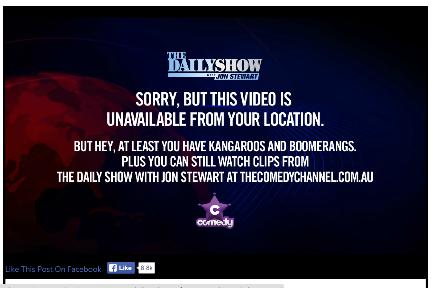





Wow Jema,
This is incredible. I’ve been researching countless websites learning all I can for my WHV. I desire to gain as much knowledge from others ahead of time and this post has been so impactfull and exciting! I didn’t even consider doing a work & stay right when I get there until things get sorted out. That’s genius! To say the least, I am inspired by what I read and look forward to reading many more of your posts.
Thank you!
Hi Jacob – so happy to hear you found the information helpful and that you’re doing your due diligence… the kind of traveler I’m proud to “know.” 🙂 Happy travels!
Jema, The time has come! I depart for my long journey for oz tomorrow. Reflecting back on all of the things I’ve read in preparation, it seems as if I took your advice on countless pointers. I’ll be getting to Brisbane from upstate NY for only $521 and because of your Skyscanner tip, I’ll have the opportunity to in Honolulu for a couple of days (saving over $150 on flight costs). Check that off the bucket list! Workaway opportunity is set up, flying only carry on, half the clothes, travel insurance.. all great advice I learned from you! Fun tip I read that may be helpful for readers; if you need world nomads insurance for a year, only purchase 6 months at a time because it saves you over $100. Anywho, you’re a great motivation and I hope you’re having amazing travels!
Jacob! So great to hear from you, and I’m so excited for your trip! Yay for affordable flights, Hawaii, work exchanging, flying carry-on… woohoo! That’s an awesome tip. Every time I buy a World Nomad’s policy, I test a set of dates and will sometimes buy coverage slightly beyond my trip because it’s cheaper. Great to know about the 6 months! I’ll add it to the packing list. Have a great trip, Jacob. Very keen to hear back from you on your journey. Keep me posted? Cheers!
Jema,
Oh goodness, where do I start? My workaway experience was a good one. It gave me an opportunity to set up my bank account and get my tax file number all lined up. I did it at a cafe, and my only other experience with workaway was at a hostel in the Netherlands. Both were businesses and I look forward to doing it with a family or small community. I feel as if it would be more enriching.
Rarely do I ever have any issues with my health, but it just so happened that within 1-2 weeks in Australia, I did an intense workout with some mates which caused me to go to the emergency room. At the end of everything, it cost me over $2600 USD in doctor/hospital bills which fortunately I could pay for up front. It was such a relief when everything was reimbursed by world nomads. Needless to say, that $543 USD that I paid for my insurance coverage was a sound investment.
Although Australia can be expensive, it’s definitely fun to try to avoid certain costs. For instance, traveling up the east coast would have been quite expensive if I took a bus going from spot to spot. I decided to just meet people along the way and tag along with their travels. Another time, after a hope for a farm job fell through, I decided to hitchhike further north. I was picked up by a young couple who offered me their place to stay up near Cairns for free (just help around the house where needed – very minimal) and they would help me find a job to extend my visa. I’ve been with them for about a month now, and they helped me get two jobs that I currently am employed. I car pool with them to work, and we always eat dinner together. As you know, slow travel is really the answer!
I considered buying a car, but now after some thought, I realize it may be better to tag along with others. The generosity I have received from people while traveling is such a beautiful experience that makes me want to strive to pay it forward even more.
I listened to a few of your episodes on your blog so far. They’re great! I liked how in one of them, (I don’t remember the exact details) but she said that “it’s hard to blog about things when it’s already all been covered” in which you replied “it’s important to understand that those blogs are only reaching a percentage of the audience. For instance, only so many people know about halftheclothes, but we can spread the love and information to those in our social circle and maybe even beyond” – not a direct quote but same message 🙂 That message definitely inspired me to start blogging about my ideas and reflections that my friends may be able to benefit from.
I’m only 3 months into this experience and have learned a lot, appreciated more, and have been inspired for the future. I like a point from an article you shared on Facebook where the girl said “it’s important to view traveling as a lifestyle and not as a vacation”..
I think I’m addicted.
I hope you’re well and still adventuring. Have you ever been to Mongolia?
Gonna go read some more of your articles!
Cheers,
– Jacob
Jacob! So great to hear an update from you! And thrilled to hear you’ve started writing and chronicling your travels. Amen to slow travel. So fulfilling to read about your Australian experiences. And I’m soooo glad you had travel insurance. It’s worth it for me – I buy it every time now, even for short legs that I wouldn’t have in the past.
Have never been to Mongolia, but I know a few folks who have. They loved it. Are you going?!
Happy Travels!
Jema, I haven’t been to Mongolia, but it seems amazing. I really admire their lifestyle and would love to experience it. I looked up workaways there, and although they’re few and far between, they seem incredible. Needless to say, it jumped up to near the top of my “to go” list.
Regarding Australia, I think I’ll leave after my first year and just keep moving. Hopefully I’ll qualify for the second holiday visa while away, in case I’d like to come back and get paid. I’m having a similar feeling that you had in retrospect to New Zealand. One year was too long for you there, and two years may be two much (consecutively) for me here.
The only asset we truly have is time, and I want to make sure I spend mine accordingly 🙂
On a different note, I’m surprised to see your reply so soon, especially after reading that you quit the internet 😛
Cheers 🙂
– Jacob
I DID quit the internet! But for three weeks. I’ve been back for a week with some great boundaries. And I’m off to live in the woods for a week in T-minus 36 hours.
Good luck deciding what to do with your very precious TIME! 😀
Hey Jema,
Thanks for the super detailed and helpful article! I will definitely keep your blog book marked for reference as I continue to plan my WHV stay. I was hoping to get some advice regarding the medical exam however. I submitted my application a week ago and just got a notice that I will need to complete a medical exam and chest X-ray from a panel doctor. After looking at the link provided on the Department of Immigration website I found that there is only one office listed in the state of Colorado and they charge $500 to complete this! I was wondering if you, or someone else you may know of, was able to use a physical exam by their regular physician? Looking for any advice to help me avoid this cost right after paying the $360 application fee.
Thanks in advance for any advice!
Hey Ciera! Man, that’s a bummer about the medical exam. I’m really surprised to hear it’s being required for a WHV visa for an American (I assume you are American if you’re looking to do an exam in CO?) You got a notice by email about the exam? I would try calling the America Services Centre and ask them what your other options are. How far in advance does the exam need done? If it was a short time frame (1-2 weeks) I might choose to fly to Thailand, get the exam done in Bangkok for $50, explore Thailand for a few weeks while the visa processes, and fly to OZ from there. Not sure how much complication and risk that idea would involve for you, though.
Good luck. Would appreciate hearing how this turns out (so others with your issue can know how to solve it)
Cheers!
Great tips! I’m going to Sydney in September for my WHV. I’m just wondering what documents to bring with me other than passport and money. Do I need to print out my grant letter? and do you know any best areas to stay in Sydney?
Hey there! You don’t have to print your grant letter. Technically, the immigration people can ask you for proof of financial self-sufficiency of $5,000 AUD. It happens very rarely, but I’ve heard it happens more to people who look possibly financially insolvent (beat up backpack & clothes) or are being profiled (race, nationality). Re: staying in Sydney, it really depends on what kind of experience you want to have. There are travel forums (lonelyplanet’s thorntree & travellerspoint) that you can search through or post your own thread to get the skinny on several different areas.
Hope that helps! Have a great trip!
Thanks Jema!
All these tips are incredibly helpful and a great resource! Heading down to Australia next month and these tips have been great to help me stretch out my money.
So glad you found everything helpful! If you think of any new tips once you’ve started on your journey, we’d love to hear them here. I’ll add them to the list.
Hope you have an amazing adventure! I’m envious and just a little “homesick” for OZ now. 🙂
This was incredibly helpful! Thank you so much! I’m flying to Sydney in about 3 weeks to begin my WHV. I am a little hesitant about finding work, and saving up money — but I’m ready for the experience. Great post!
Glad to be helpful! Good luck on your journey – it will be great!
Please give me work permit visa in austarila
Hi Yogesh – the Department of Immigration is in charge of work visas. Here’s their website: http://www.border.gov.au/
Good luck!
Nice tips! I particularly liked when you mention travelling elsewhere. I get a lot of questions about that and I really don’t understand why people would want to waste part of their limited time travelling. I travelled before and after my WHV to break up the journey from and back to the UK. Every holiday I got from work during that year I spent exploring Australia and I still feel like I barely scratched the surface!
Same! People say they’re planning a trip and thinking of making OZ a stop on their tour. Do you hear this from primarily Americans? I think everyone just looks at their relatively small, once-in-a-lifetime travel window and wants to cram in everything they’ve ever wanted to see.